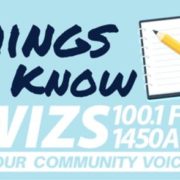Warren County is hiring a Community Development Division Manager to provide support across the county in various areas, from housing development projects and workforce development to food security and poverty reduction.
The application is available at the county’s Human Resources website: https://www.warrencountync.com/166/Human-Resources. The position closes on Sept. 13, according to information from Charla Duncan, Warren County Community & Economic Development director.
This is a newly created position, Duncan stated, designed to support various initiatives in the county, including housing, broadband, transportation, recreation, workforce development, and early child development.
“This role will be characterized by a high-degree of initiative and dedication to preserving and producing affordable housing and an ability to work with diverse stakeholders, including local, state, and federal agencies, as well as lenders, private foundations, non-profits, and the business community,” Duncan stated, adding that one role will be to develop and implement a strategic plan to address the unmet housing needs within the county.
The job follows the normal hours of operation for Warren County government – Monday-Friday from 8:30 a.m. to 5 p.m., but there will be occasions to work outside those office hours to attend workshops, meetings and special events. It’s mostly an on-site office job with the possibility for some remote work in accordance with county policy.
Read more details below:
ESSENTIAL FUNCTIONS/TYPICAL TASKS:
(These are intended only as illustrations of the various types of work performed. The omission of specific duties does not exclude them from the position if the work is similar, related, or a logical assignment to the position.)
- Work with the colleagues to research and develop land use policies to encourage housing in areas with access to infrastructure and services, as well as address workforce and workforce housing demand
- Ensure educational and financial assistance programs to homeowners are promoted and fully utilized by residents
- Develop programs with innovative approaches to affordable and workforce housing
- Develop homeowner assistance programs
- Facilitate educational and informational workshops to educate renter and first-time homebuyers on rental assistance program as well as home purchase procedures, finance, and maintenance
- Manage and oversee programs funding by the Department of Housing and Urban Development (HUD) and oversees the administration and contract compliance of community development programs such as the Community Development Block Grant (CDBG)
- Maintains up-to-date knowledge of housing and community development activities in the county and across the state, as well as nationwide best practices
- Develop and recommend policies and programs related to community development programs for the county to consider; prepares reports and delivers presentations to committees and county commissioners
- Develop and distribute information through a variety of media outlets
- Facilitate community engagement efforts for program areas
- Conduct research, compile and analyze data as needed for all departments (related to economic & community development)
- Write and administer grants related to community development initiatives
- Analyze and interpret state and federal policy
- Assist with transportation projects
- Assist in marketing the county in residential and workforce recruitment efforts
- Assist in overseeing performance measurement for the Community and Economic Development Office
- Develop surveys and research tools as needed pertaining to community development
- Assist in strategic planning and implementation
- Assist in departmental community and economic development projects as needed
- Assist with community and economic development budget tracking as needed
- Serve on county committees as needed
- Other duties as needed (we’re all on the same team)
KNOWLEDGE, SKILLS AND ABILITIES:
Knowledge of the local community and region is preferred; ability to research and understand economic and community development concepts and practices; ability to research and understand local, state, and federal laws related to community and economic development; ability to research and understand concepts and laws related to land use and planning and zoning; must be a team player willing to take on tasks aligned with the strategic vision of Warren County and the Community and Economic Development Office; punctual and reliable; effective communicator with both public speaking skills and written skills; can work independently with minimal direction; values rural communities and is community-oriented with great inter-personal skills; eager to serve the greater public, including a diversity of backgrounds and lifestyles; pragmatic and logical, but also excited by innovation and thinking outside of the box.
EDUCATION AND EXPERIENCE:
Preference is for a candidate to have graduated from an accredited four-year college or university with a degree in public administration, community development, planning, or social sciences, and have at least four years of work experience related to this role. There is a desire for an advanced degree in any of those areas, but it is not required. There is a desire for a candidate that has previously worked in local government. Experience related to developing and implementing affordable housing and community development programs is desired. Open to considering other combinations of education and experience.
PHYSICAL REQUIREMENTS:
This is light working requiring minimal physical movement. Vocal communication is required for expressing or exchanging ideas by means of the spoken word, and conveying detailed or important instructions to others accurately; hearing is required to perceive information at normal spoken word levels, and to receive detailed information through oral communications and/or to make fine distinctions in sound; visual acuity is required for preparing and analyzing written or computer data, visual inspection involving small defects and/or small parts, operation of machines, operation of motor vehicles or equipment, determining the accuracy and thoroughness of work, and observing general surroundings and activities; the worker is subject to inside and outside environmental conditions, and atmospheric conditions.
SPECIAL REQUIREMENTS:
Must possess an appropriate driver’s license valid in the State of North Carolina; considerable knowledge of word processing and the Microsoft Office Suite; considerable knowledge of social media platforms. Knowledge of GIS is helpful, but not mandatory.






